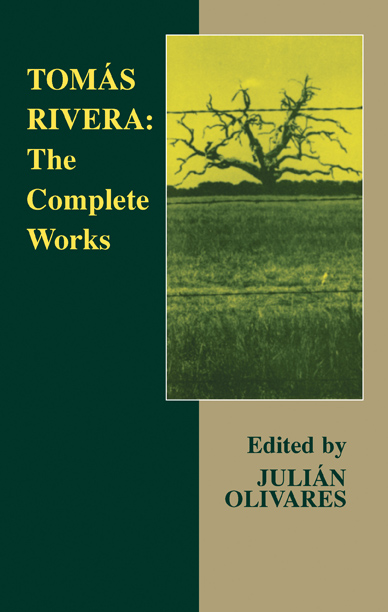Tomás Rivera quite possibly has been the most influential voice in Chicano literature. Besides his masterpiece, …y no se lo tragó la tierra / …And the Earth Did Not Devour Him, included here is the sum total of his published works, in English and Spanish, as well as many that never made print in his lifetime.
“[Tomás Rivera’s . . .y no se lo tragó la tierra/ . . .And the Earth Did Not Devour Him] . . . represents the first milestone in Mexican-American literary history after the turbulent events of the 1960’s and sets itself explicity within the political and social contexts of the post-World War II agricultural worker’s life . . . Rivera’s novel immediately established itself as a major document of Chicano social and literary history.” —Chicano Narrative
“In his prose fiction, Tomás Rivera is an accuser; in his poetry, he is a searcher. He derived his inspiration from the migrant workers, people who search. The search was, for Rivera, the most important metaphor defining the Americas. His great ambition was to be a searcher, an ambition he fulfilled through his poetry, collected… by another searcher, Julián Olivares.” —Luis Leal
“A book that students need to read right alongside O. Henry and Steinbeck in English and history classes.” —The Dallas Morning News
“Rivera was nothing less than a craftsman in the mold of Ernest Hemingway . . . . Simply put, [this] is a milestone in Chicano literature that should grace the shelves of every academic and personal collection.” —El Paso Times
Tomás Rivera (1935-1984) was born to a family of migrant farm workers in the South Texas town of Crystal City. In spite of moving constantly to work the crops, Rivera managed to graduate from high school. He went on to obtain a degree in English from Southwest Texas State University. He then earned a master’s degree in Spanish literature and a doctorate in Romance languages and literatures. He became a university administrator, and in 1979 he was appointed chancellor of the University of California, Riverside, a position he held for five years until his sudden death in 1984.









